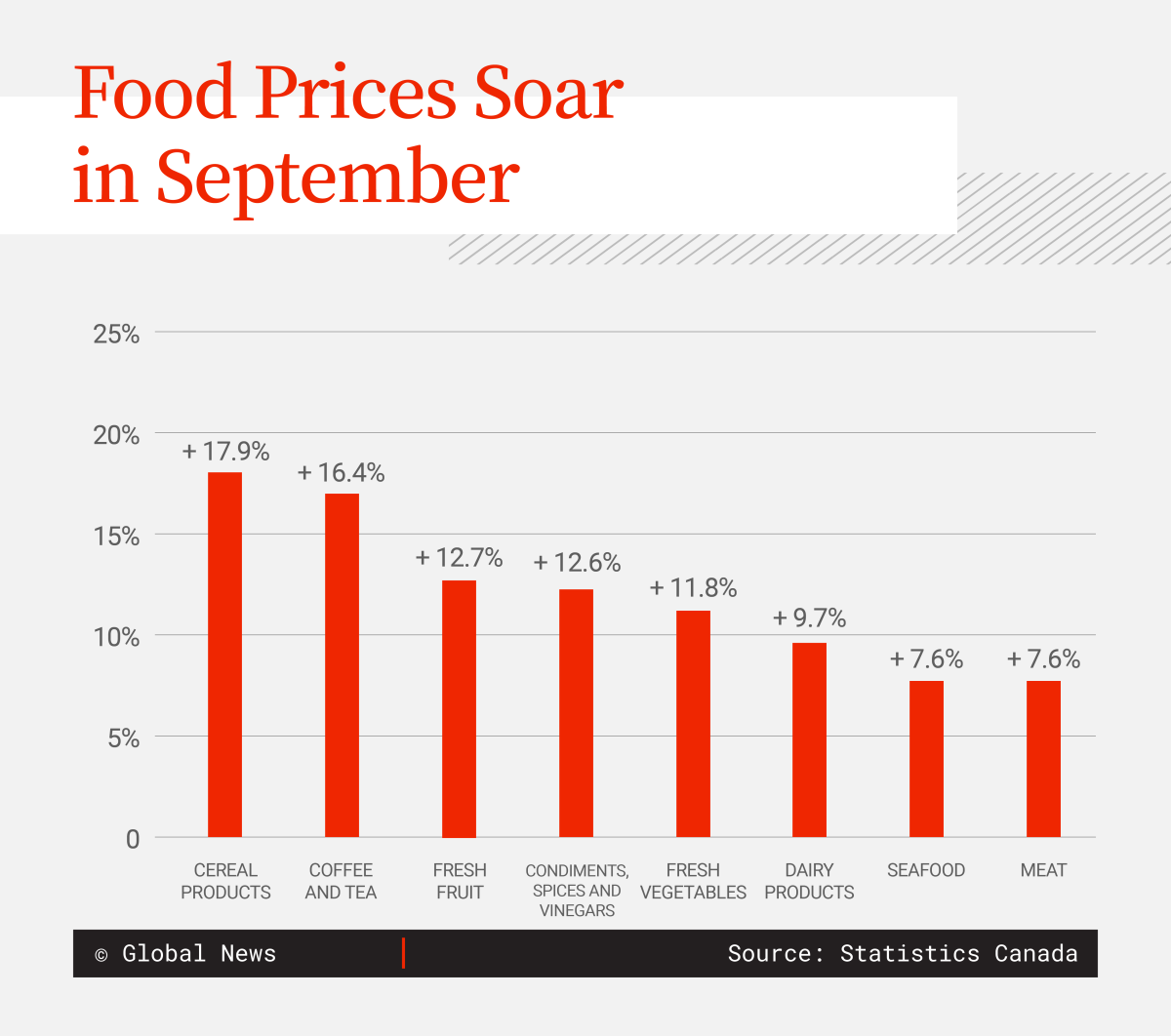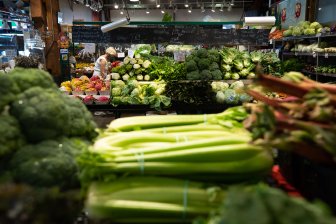With eye-popping inflation hitting most aisles of the grocery store, some chains are working harder than ever with deals and pledges to lure in shoppers.
Grocery and finance experts tell Global News that switching stores for the best deal can sometimes help shave cents off your final bill, but few expect recent promises from major grocers to help Canadians fight inflation.
Grocery bills have been a particular source of pain for households this year, as the surging price of food has consistently outpaced the general inflation rate over the last 10 months, according to Statistics Canada.
Inflation on items from the grocery store was up 11.4 per cent last month, setting a new 41-year high.
Prices on many grocery store staples soared in September, according to.
Sylvain Charlebois, director for the Agri-Food Analytics Lab at Dalhousie University, says it was a well-timed decision, then, for Loblaw to announce a price freeze on its No Name brand items on Monday, getting ahead of the latest Consumer Price Index figures.
Charlebois gives “credit” to Loblaw for the move, which applies to more than 1,500 items and runs from November to January — covering the lucrative holiday shopping season for the grocery giant.
He adds that the wide breadth of products offered in the line can see shoppers create a complete “portfolio of products,” should they want to adapt their habits to take advantage of the price freeze.
While Charlebois tells Global News it’s a month or two “too late,” he says that with many Canadians pointing the finger at grocers themselves for the soaring cost of food, it falls to the chains to show they’re taking Canadians seriously.
“I’m not sure if it can actually counter the effects of inflation. It will provide predictability to Canadians instead of looking at sticker shockers,” Charlebois says of Loblaw’s price freeze.
“Predictability has a lot of currency.”
Metro responded the next day, asserting that maintaining prices through the holiday season is standard practice in the grocery industry.
The grocer also said then that it would not accept cost hikes from suppliers during roughly the same period, though Charlebois said this move “led to a lot of confusion” and “didn’t really do anything.”
Read more:
NDP calls for probe into grocery store profits amid high food inflation
Others are also unconvinced that Loblaw’s price freeze will make a material impact on families struggling with inflation.
Personal finance expert Rubina Ahmed-Haq points out that for Loblaw to freeze prices now, they’re merely maintaining the higher costs that have already risen with inflation.
“It’s not like they’re bringing prices down and actually making a difference so that this week when you shop, it’s going to feel a little bit more affordable than last week,” she tells Global News.
“I would have liked to have seen grocery stores … actually make a difference by lowering prices to reflect the fact that transportation is costing less and that inflation is cooling.”
Full-service stores likely to cost more
Switching grocery stores can make sense for some shoppers feeling the strain of inflation, but experts say there are a few caveats to keep in mind before changing up your routine.
Ahmed-Haq says she’s hearing more and more shoppers are dropping “brand loyalty” as prices rise.
“In the past, we would go to the same grocery stores because they’re close to our home and we like the products they sell and maybe we get great points there because of the credit card we have,” she says.
“Now, consumers, grocery store shoppers are going to where the prices are the lowest.”
Recent research from the Agri-Food Analytics Lab reveals how consumer shopping habits are changing.
The survey, conducted in September, showed that 21 per cent of shoppers are opting for private label brands like No Name more often.
Roughly one in three shoppers are using coupons more often, while 32.1 per cent are reading weekly fliers more often.
Some 19.1 per cent of shoppers are visiting discount stores more often to buy food, and 11.5 per cent are buying food more regularly from the dollar store.
Simon Somogyi, food business professor at the University of Guelph, tells Global News that as a rule of thumb, grocers that have more in-store services like a large deli counter and in-house bakery are going to run more expensive than discount options like the aptly named No Frills or Food Basics.
The total on the end of your receipt isn’t the only cost to keep in mind, however. Somogyi notes that the return for shopping at discount outlets wears off the farther you have to travel out of your way to get there.
“If you happen to travel across town or drive long distances to get one cheaper product, you’d be spending a lot on fuel. That’s a bit of a waste of money there as well,” he says.
When can shoppers expect relief?
While Canadians have been able to place blame on Russia’s invasion of Ukraine and inclement weather driving up prices at the grocery store, Charlebois says Canada’s own loonie is increasingly to blame for food inflation.
As the winter months approach, Canada will need to rely on imports from the United States and Mexico for fresh food deliveries, he says. As the Canadian dollar falters relative to the U.S. greenback, goods from south of the border will cost importers more and those prices will be passed on to consumers.
Read more:
The loonie is at a nearly 2-year low. What does that mean for inflation?
“It’s a dangerous time of year to see the currency become a problem because we’re slowly marching towards the winter,” Charlebois says.
Despite these short-term headwinds, Charlebois says that after a record year for price increases at the grocery store, he expects 2023 will be “kinder” to consumers.
Somogyi notes that with the Bank of Canada’s path of rising interest rates, the Canadian dollar could appreciate a bit further this year and keep import prices a bit more manageable.
But he also says Canadians can mitigate the rising costs of fresh fruit and vegetables heading into the winter months by buying them frozen.
Food that’s been “snap frozen” at the point of harvesting seals in the nutrition and tends to retail for cheaper in the grocery store, Somogyi says. Consumers also usually waste less of the frozen product because it’s resealed and put back in the freezer when it’s opened, as opposed to the fresh alternatives that can expire before use.
Somogyi also notes that some of the grocery-store items facing the highest rates of inflation are those with grains — pasta, cereals and bakery items, for example.
While grain commodity prices have decreased globally in recent months, those discounts haven’t yet made their way to grocery store shelves, he says.
Somogyi says Canadians would be wise to shop around for products without grains or price-compare on these items to avoid the sharpest pinch to inflation.
“It may mean having to cut back on those items to some extent. Look for cheap options,” he says.
“I think it’s important to be a smart shopper at this time when all food prices are going up quite dramatically.”
— With files from Global News’ Ross Lord, Kyle Benning




